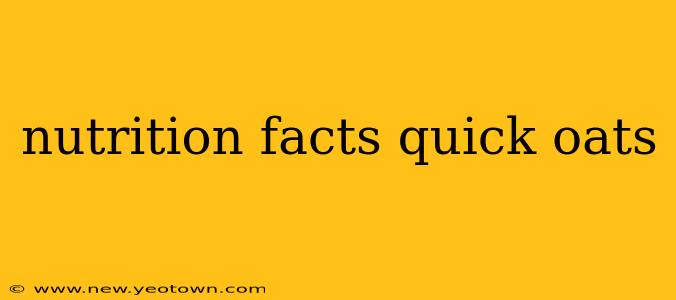Let's be honest, quick oats are a breakfast staple for many. Their convenience and versatility make them a go-to for busy mornings. But beyond the ease of preparation, what's truly in that bowl of creamy goodness? This deep dive into quick oats nutrition facts will unravel the nutritional profile, address common questions, and help you make informed choices about this breakfast champion.
What are the Basic Nutritional Facts of Quick Oats?
A typical serving of ½ cup (40g) dry quick-cooking oats offers a surprisingly robust nutritional punch. Think of it as a miniature powerhouse packed with essential nutrients. We're talking about a good source of fiber, which aids digestion and keeps you feeling full longer. They're also a decent source of several vitamins and minerals, contributing to overall health and well-being. However, the exact nutritional content can vary slightly depending on the brand and any added ingredients.
Are Quick Oats a Good Source of Fiber?
Absolutely! Fiber is a key component of a healthy diet, and quick oats are a fantastic source. That fiber content contributes significantly to digestive health, helping regulate bowel movements and prevent constipation. It also plays a vital role in managing blood sugar levels and promoting a feeling of satiety, making quick oats an excellent choice for weight management. But remember, the processing of quick oats does reduce some of the fiber content compared to steel-cut or rolled oats.
How Many Calories are in a Serving of Quick Oats?
A typical ½ cup (40g) serving of dry quick oats contains approximately 150 calories. This calorie count can fluctuate based on the brand and the addition of things like sugar, flavorings, or milk. Remember, the way you prepare your oats also impacts the final calorie count. Adding sweeteners, fruits, nuts, or milk will increase the overall caloric value.
What Vitamins and Minerals are Found in Quick Oats?
Quick oats are a modest source of several essential vitamins and minerals. You'll find a good amount of manganese, an important mineral involved in metabolism and bone health. They also provide some magnesium, crucial for muscle function and nerve health, and iron, vital for red blood cell production. While not overly abundant in vitamins, they still contribute to a balanced nutritional intake.
How Do Quick Oats Compare to Other Oat Types?
Quick oats are processed more than steel-cut or rolled oats, resulting in a shorter cooking time. This processing, however, does slightly reduce some of the fiber and nutrient content compared to their less-processed counterparts. While still a healthy option, steel-cut and rolled oats generally retain more of their nutritional integrity. The choice really comes down to personal preference and the time you have available for breakfast preparation.
Are Quick Oats Gluten-Free?
Generally, oats themselves are naturally gluten-free. However, cross-contamination during processing can introduce gluten. To ensure gluten-free consumption, look for certified gluten-free quick oats. If you have celiac disease or a severe gluten sensitivity, carefully check the label and choose products explicitly labeled as certified gluten-free.
Can I Eat Quick Oats Every Day?
Yes, incorporating quick oats into your daily diet is perfectly acceptable as part of a balanced and varied eating plan. The fiber, vitamins, and minerals they provide contribute positively to your overall health. However, remember to vary your diet and incorporate other whole grains, fruits, vegetables, and proteins to ensure a diverse nutritional intake. Don't rely solely on quick oats for your nutritional needs.
In conclusion, quick oats offer a convenient and nutritious start to your day, boasting a good amount of fiber, essential minerals, and manageable calories. While slight nutritional differences exist compared to other oat types, they remain a valuable addition to a healthy diet. Remember to check labels, consider your dietary needs, and enjoy them as part of a well-rounded eating plan!

